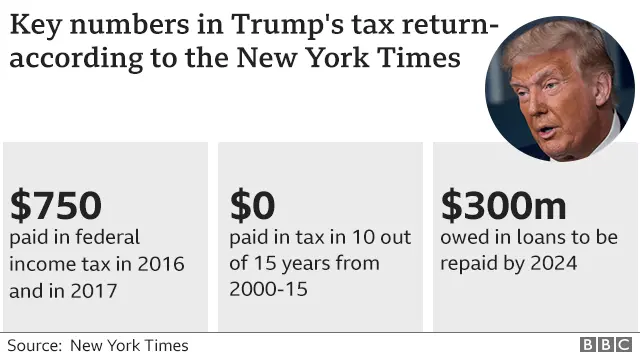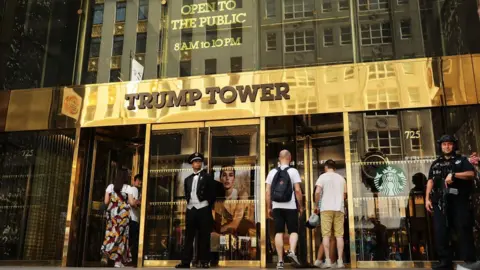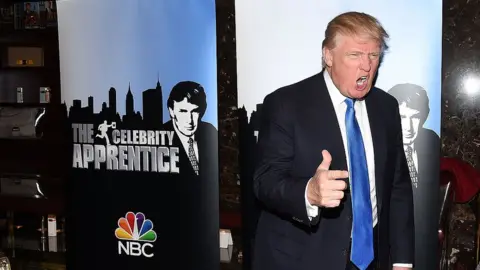Donald Trump 'paid $750 in federal income taxes in 2016 and 2017' - NY Times
Donald Trump paid just $750 (£580) in federal income tax both in 2016, the year he ran for the US presidency, and in his first year in the White House, the New York Times says.
The newspaper - which says it obtained tax records for Mr Trump and his companies over two decades - also says that he paid no income taxes at all in 10 of the previous 15 years.
The records reveal "chronic losses and years of tax avoidance", it says.
Mr Trump called the report "fake news".
"Actually I paid tax. And you'll see that as soon as my tax returns - it's under audit, they've been under audit for a long time," he told reporters after the story was published on Sunday.
"The IRS [Internal Revenue Service] does not treat me well… they treat me very badly," he said.
Mr Trump has faced legal challenges for refusing to share documents concerning his fortune and business. He is the first president since the 1970s not to make his tax returns public, though this is not required by law.
The Times said the information scrutinised in its report was "provided by sources with legal access to it".
The report came just days before Mr Trump's first presidential debate with Democratic rival Joe Biden and weeks before the 3 November election.
What are the key claims?
The Times said it reviewed tax returns relating to President Trump and companies owned by the Trump Organization going back to the 1990s, as well as his personal returns for 2016 and 2017.
It said the president paid just $750 in income taxes in both 2016 and 2017, while he paid no income taxes at all in 10 of the previous 15 years, "largely because he reported losing much more money than he made".

Before becoming president, Mr Trump was known as a celebrity businessman and property mogul, building an image of a hugely successful self-made billionaire which could be dented by the latest revelations, observers say.
But the newspaper says his reports to the IRS "portray a businessman who takes in hundreds of millions of dollars a year yet racks up chronic losses that he aggressively employs to avoid paying taxes".
According to the US Bureau on Labor Statistics, the average American household paid $9,302 in federal income tax in 2018, on an average earnings figure of $78,635.
In an annual financial disclosure that he is required to make as president, President Trump said he made at least $434.9m in 2018. The newspaper disputes this, alleging that his tax returns show the president had instead gone into the red, with $47.4m in losses.
The Trump Organization joined the president in denying the allegations in the report. The company's chief legal officer, Alan Garten, told the Times that "most, if not all, of the facts appear to be inaccurate".
 Getty Images
Getty Images"Over the past decade, President Trump has paid tens of millions of dollars in personal taxes to the federal government, including paying millions in personal taxes since announcing his candidacy in 2015," he said.
By using the term "personal taxes", the New York Times points out, Mr Garten appears to be conflating other federal taxes paid by Mr Trump - such as social security, Medicare and taxes for people who work in his household - with federal income tax.
What else does the report say?
The newspaper also claims that "most" of Mr Trump's biggest businesses - such as his golf courses and hotels - "report losing millions, if not tens of millions, of dollars year after year".
"That equation is a key element of the alchemy of Mr Trump's finances: using the proceeds of his celebrity to purchase and prop up risky businesses, then wielding their losses to avoid taxes," it says.
It adds that the president is personally responsible for more than $300m in loans, which will come due in the next four years.
The newspaper also alleges that some of President Trump's businesses have received money from "lobbyists, foreign officials and others seeking face time, access or favour" from the president.
 Getty Images
Getty ImagesThe Times says it used tax records to find out how much income the president makes from his companies overseas, alleging that he made $73m in revenue from abroad in his first two years at the White House.
Much of that came from his golf courses in Ireland and Scotland, but the Times says the Trump Organization also received money "from licensing deals in countries with authoritarian-leaning leaders or thorny geopolitics".
The Times alleges that the licensing deals netted $3m from the Philippines, $2.3m from India and $1m from Turkey.
The newspaper claims that President Trump made $427.4m in total up until 2018 in revenues from The Apprentice US series, as well as from branding deals where organisations paid to use his name. He also made $176.5m in profit by investing in two office buildings, it is alleged.
However, the Times alleges that the president paid almost no taxes on these sizeable earnings, because he reported that the businesses that he owns and runs made significant losses.
The Times also alleges that Mr Trump reduced his taxable income by paying consulting fees to Ivanka Trump, his daughter and senior adviser. In financial disclosures filed in 2017, she reported receiving $747,622 from a consulting company she co-owned. Consulting fees of exactly the same amount were claimed as tax deductions by the Trump Organization for hotel projects, the Times says.
Mr Trump is also said to have written off more than $70,000 in hair-styling costs as business expenses during his time on The Apprentice.
 Getty Images
Getty ImagesThe newspaper also claims that President Trump has been making use of a tax code that enables business owners to "carry forward leftover losses to reduce taxes in future years".
For example, the newspaper says that President Trump's largest golf resort, Trump National Doral, near Miami, has made $162.3m in losses since he bought it in 2012. Similarly, his two golf courses in Scotland and one in Ireland have reported a combined $63.6m in losses, it is alleged.
Tax lawyer and policy analyst Steve Rosenthal, who has previously worked with the Times looking into Mr Trump's finances, said the story "goes to the heart of Trump's image as a successful businessman".
"You cannot generate the level of losses Trump has generated without failing spectacularly. How he continues to generate losses and continues to operate suggests he is continuing to borrow money to keep operations afloat," he told the BBC World Service.
But how much, if any, damage this will do to the president is up for debate, says the BBC's North America editor Jon Sopel.
This time four years ago, when Hilary Clinton upbraided him over how little tax he paid, Mr Trump replied: "That makes me smart." A lot of his supporters applauded, our editor points out.
What has the reaction been?
Mr Trump's political opponents condemned his reported tax arrangements.
House Speaker Nancy Pelosi, the most powerful Democrat in Washington, said the report showed Mr Trump had taken "extraordinary measures" to "game the tax code and avoid paying his fair share of taxes".
Taking to Twitter, Senate minority leader Chuck Schumer asked Americans to raise their hands if they had paid more in federal income tax than Mr Trump.
Democratic presidential candidate Joe Biden has not commented so far, but his campaign team highlighted on Twitter that teachers, firefighters and nurses all paid much more than $750 in tax.


Unwanted distraction for Trump or more?
So this is what Donald Trump has been keeping out of public view for all these years?
The president's tax returns, according to the New York Times, do not provide evidence of a nefarious connection to Russian mobsters or other shady figures, as some have speculated. Instead, they show that the real estate and reality television mogul's financial empire is built on sand - haemorrhaging money, hundreds of millions of dollars in debt, and arranged to pay almost nothing in federal taxes.
These arrangements will be closely scrutinised in the coming weeks, with moves of questionable legality making their own headlines.
Trump has boasted in the past of his ability to take advantage of every loophole in what he says is a corrupt tax system. When he's not denying this report, he may offer a similar defence - and his supporters will probably find that sufficient. The Americans who are outraged that they paid more in taxes than the billionaire US president are probably already against him.
The Times story, however, is yet another unwanted distraction for the president. Every day spent on it is one the Trump campaign can't focus on changing the dynamic in a race that appears tilted against him.

